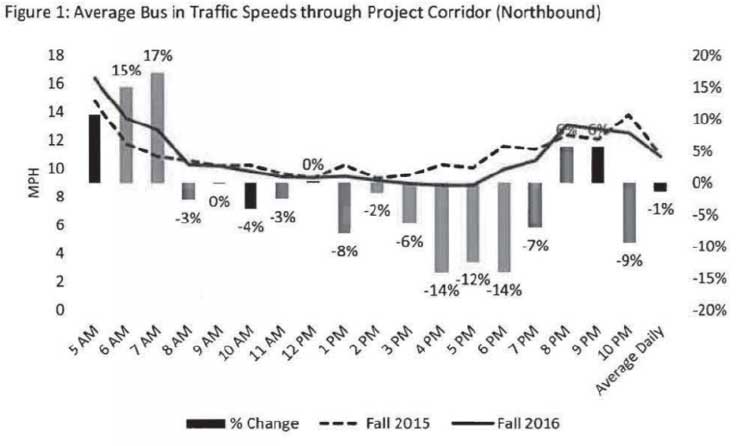The Telegraph Avenue Complete Streets Project has been lauded as one of America’s best new bike lanes of 2016 – the project has decreased collisions for all modes by 40 percent, increased yield rates, and reduced speeding. However, not everyone is happy about the recent changes, including AC Transit. The project has increased AC Transit’s travel times by up to 15 percent by reducing travel speeds and increasing the distance and time needed to pull in and out of stops. AC Transit has consequently experienced a 30 percent decrease in peak hour bus volumes.
AC Transit’s frustrations with the City boiled over at the March 8th board meeting while reviewing the City’s recent progress report. Director Chris Peeples scolded the City for implementing a “disaster” that prioritizes “1,200 healthy, active people, overwhelmingly white and middle class [while] disadvantaging 9,000 bus riders, overwhelmingly people of color, overwhelmingly poor, and many of whom have physical disabilities.” Peeples went on to assert that OakDOT’s progress report is an “absolute disgrace” that ignores these equity considerations. Peeples suggested that AC Transit initiate a Title VI investigation against the City and “vigorously oppose” similar treatments on corridors like 20th Street.
While Director Greg Harper disagreed with the combative approach of Director Peeples, the board seemed to be in agreement that the project was detrimental to AC Transit’s service and out of line with AC Transit’s objectives. Even AC Transit’s staff report and presentation possessed a critical tone in assessing the City’s efforts, a somewhat unusual bias in typically mundane government documents. The City of Oakland wrote a post on Medium defending the project’s effects on transit service, presumably in response to AC Transit’s criticism.
Some of AC Transit’s frustrations with the City are understandable. The project’s design originally included bus boarding islands to eliminate delays pulling in and out of bus stops and bus-bike conflicts. Unfortunately, these boarding islands won’t arrive for two years due to the availability of funds from the state’s Active Transportation Program (AC Transit’s staff report erroneously blames the City for this delay). Problems with double parking associated with this interim design approach are well documented; the bus operations issue is another tradeoff built in to this cheap-and-fast approach. Staff from the City and AC Transit are working together to incorporate temporary bus boarding islands into the current design.
However, AC Transit’s ridership losses along the corridor are largely self-inflicted. The Complete Streets Project’s implementation happened to coincide with a 25 percent reduction in service by AC Transit along Telegraph (consolidating eight buses per hour, per direction for Routes 1 and 1R into six buses per hour, per direction for Route 6).
Moreover, in adopting a narrow focus on bus operations, AC Transit fails to recognize the project’s benefits to bus riders. As Liz Brisson of Transport Oakland wrote to AC Transit, pedestrian activity and safety is critical to supporting bus ridership: ”A street with more activity is a more attractive one to wait for a bus at. A street safer for people walking is a street safer for bus riders who must cross Telegraph at some point in either their inbound or outbound trip.” The agency’s opposition of complete streets projects in Oakland or Berkeley’s Bike Plan, coupled with its implementation of traffic signal changes that delay pedestrians, are short-sighted in achieving long-term sustainability objectives.
AC Transit’s concerns are legitimate, but its approach is disappointing and counterproductive. The persistence of the agency’s us-against-them attitude toward the cities and advocates that it serves contrasts the direction of peer transit agencies actively pursuing complete streets projects and implementing concepts from the NACTO Transit Street Design Guide. Improving the East Bay’s transportation system is critical to realizing the sustainability and growth needs of the coming decades; we need a robust and collaborative relationship between AC Transit and cities like Oakland to achieve success.



